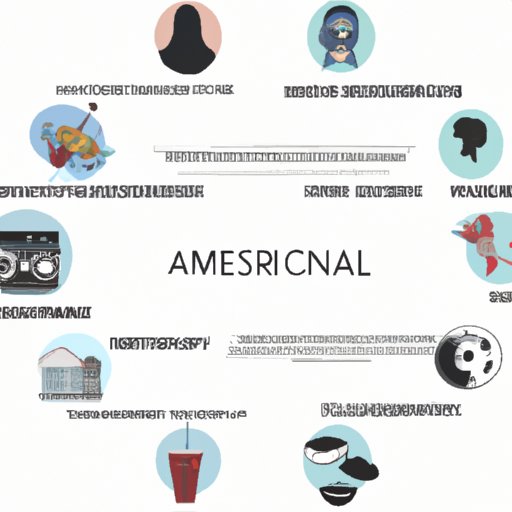Introduction
Stereotypes are oversimplified generalizations about a group of people based on their race, ethnicity, or culture. They can be positive or negative, but they are often untrue and can lead to misunderstanding, prejudice, and discrimination. With regards to American culture, there are a variety of stereotypes that have been created and perpetuated over time.

Hollywood Films and Depictions of American Culture
Hollywood films are one of the most influential tools in shaping perceptions of American culture. From westerns to comedies to dramas, films often depict certain stereotypical characters, settings, and storylines. For example, films often portray Americans as being obsessed with money, power, and success, and typically show them living in large suburban homes, driving flashy cars, and enjoying lavish lifestyles.
These depictions often involve stereotypes such as the idea of the “American Dream”, where anyone can achieve success if they work hard enough; the “rugged individualist”, who is independent and self-reliant; and the “all-American family”, which consists of a married couple with children living in a nuclear family.
Social Media and Perpetuating Stereotypes
Social media has become an increasingly powerful tool for perpetuating stereotypes of American culture. Platforms such as Facebook, Instagram, and Twitter allow users to post pictures, videos, and comments that can quickly spread across the internet and reach millions of people. This can be used to create and reinforce certain ideas about American culture, such as the idea that all Americans are rich, live in big houses, and drive expensive cars.
Another example is the stereotype that all Americans are shallow, materialistic, and obsessed with celebrity culture. This is often perpetuated through posts about celebrities, fashion, and luxury items. These posts can give the impression that these things are more important to Americans than other issues, such as poverty, inequality, and social justice.
Mass Media and Reinforcing Stereotypes
Mass media also plays a role in creating and reinforcing stereotypes of American culture. Television shows, radio programs, newspapers, and magazines often present certain images and ideas about American culture that can shape public opinion. For example, many television shows portray Americans as being loud, brash, and rude, while magazines often feature stories about wealthy, successful people.
These images and stories can give the impression that these traits and lifestyles are what define American culture, when in reality, there is much more to it than that. By presenting only certain aspects of American culture, mass media can reinforce existing stereotypes and create new ones.

Education System and Reinforcing Stereotypes
The education system can also contribute to reinforcing stereotypes of American culture. In schools, students are often taught about American history and culture through textbooks that present a certain narrative. This narrative can focus on certain topics, such as the achievements of white men, while leaving out the contributions of women, people of color, and other minority groups.
This can lead to a skewed view of American culture, where certain perspectives are ignored and certain stereotypes are reinforced. For example, students may come away with the impression that America is a predominantly white, male-dominated society, when in reality, this is not the case.
Popular Music and Shaping American Culture
Popular music has also played a significant role in shaping how Americans view their own culture. From jazz to hip hop to rock and roll, different genres of music have provided a soundtrack for different eras of American history. These songs often contain lyrics that can convey certain messages about American culture, such as the idea that money is the most important thing, or that violence is an acceptable way to solve problems.
These messages can influence how people perceive American culture and can reinforce certain stereotypes. For example, rap music often contains lyrics that glorify materialism, violence, and misogyny, which can give the impression that these are common traits of American culture.
Ethnicity, Gender, and Class
Ethnicity, gender, and class can also play a role in shaping stereotypes of American culture. For example, certain ethnic groups are often portrayed as being “lazy”, “uneducated”, or “criminals”, while women are often portrayed as being subservient and dependent. Similarly, people from lower-income backgrounds are often portrayed as being unambitious or “deadbeats”.
These stereotypes can be perpetuated through films, television shows, and other forms of media, as well as through everyday conversations and interactions. By portraying certain groups in a certain way, these stereotypes can become embedded in the collective consciousness and can affect how people think about American culture.

Religious Traditions and Perpetuating Stereotypes
Religious traditions can also play a role in perpetuating stereotypes of American culture. For example, Christianity is often associated with beliefs such as traditional gender roles, anti-abortion views, and opposition to same-sex marriage. These beliefs are often seen as being “typical” of American culture, even though they are not shared by everyone.
Other religious traditions, such as Islam and Judaism, can also be associated with certain stereotypes. For example, Muslims are often stereotyped as being terrorists, while Jews are often stereotyped as being wealthy and powerful. These stereotypes can be reinforced through films, television shows, and other forms of media.
Conclusion
In conclusion, there are a variety of stereotypes of American culture that have been created and perpetuated over time. These stereotypes are often perpetuated through films, social media, mass media, education system, popular music, ethnicity, gender, class, and religious traditions. By understanding how these stereotypes are created and reinforced, we can begin to challenge them and create a more accurate and inclusive view of American culture.
(Note: Is this article not meeting your expectations? Do you have knowledge or insights to share? Unlock new opportunities and expand your reach by joining our authors team. Click Registration to join us and share your expertise with our readers.)
